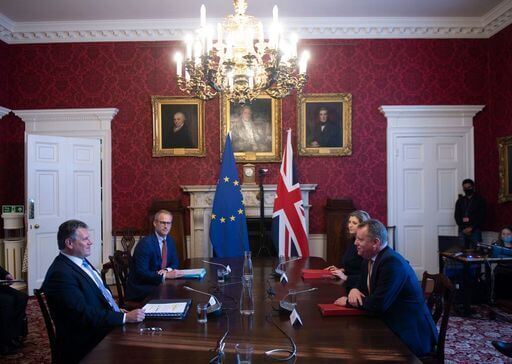The UK and EU could be approaching an impasse on the Northern Ireland Protocol, as both parties are set to lay out their approach to the intensive talks scheduled to commence later this month.
The Protocol was implemented to prevent a hard border between Northern Ireland and the Republic of Ireland in the wake of Brexit, and by keeping Northern Ireland in the EU’s single market for goods.
In a speech in Lisbon on Tuesday, Brexit minister Lord Frost will outline the UK’s approach to the ongoing dispute, while the EU is set to announce their plans on Wednesday.
After reports that the UK will seek the removal of the European Court of Justice’s (ECJ) oversight from the deal, Ireland’s foreign minister Simon Coveney took to Twitter to criticise this approach.


EU working seriously to resolve practical issues with implementation of Protocol – so UKG creates a new “red line” barrier to progress, that they know EU can’t move on…. are we surprised?
Real Q: Does UKG actually want an agreed way forward or a further breakdown in relations? https://t.co/4MhgEdlxAf— Simon Coveney (@simoncoveney) October 9, 2021
Lord Frost hit back, tweeting: “1. I prefer not to do negotiations by twitter, but since @simoncoveney has begun the process… …the issue of governance & the CJEU is not new. We set out our concerns three months ago in our 21 July Command Paper. The problem is that too few people seem to have listened.
He went on: “2. We await proposals from @MarosSefcovic. We will look at them seriously & positively whatever they say. We will discuss them seriously and intensively. But there needs to be significant change to the current situation if there is to be a positive outcome.”
Thomas Byrne, Ireland’s minister for European affairs, told the BBC Radio 4 Today programme on Monday morning that he thought “everybody is seeking a way to make the Protocol work better… and that’s certainly the case on the European side” and said that European Commission Vice President Maros Sefcovic had spent extensive time speaking with people in Northern Ireland about their hopes.
He said the EU’s response on Wednesday will be “generous” and acknowledge “some of the challenges” of the deal.
He said he was “very confident” that the EU’s proposals will respond to what he deemed the “practical concerns of businesses and traders” in the UK region and improved trade between NI and the Republic and between NI and the UK.
While he said the EU commission had “gone the extra mile” in drawing up these plans, he suggested that the removal of the ECJ oversight was an “extremely theoretical issue” and that the “issues to resolve are the practical issues”.
Last week it was reported that the European Commission would offer an exception to the Protocol which would permit “national identity goods” such as sausage to enter the region, despite general EU rules restricting chilled meats from non-EU countries.
Over the summer the possibility of shops in Northern Ireland being banned from selling British sausages after the Protocol’s grace period expired brought the UK & EU to the brink of a trade war.
Last week former Labour MP and independent peer Baroness Kate Hoey told BBC Two’s Politics Live that “the prime minister knows the protocol should never have been signed up to.”
In September Brexit minister Lord Frost told the House of Lords that it would be a “significant mistake” to assume the UK would not trigger Article 16, the part of the Northern Ireland Protocol which permits elements of the deal being temporarily suspended if they are evidenced to be causing “serious economic, societal or environmental difficulties that are liable to persist, or to diversion of trade.”












